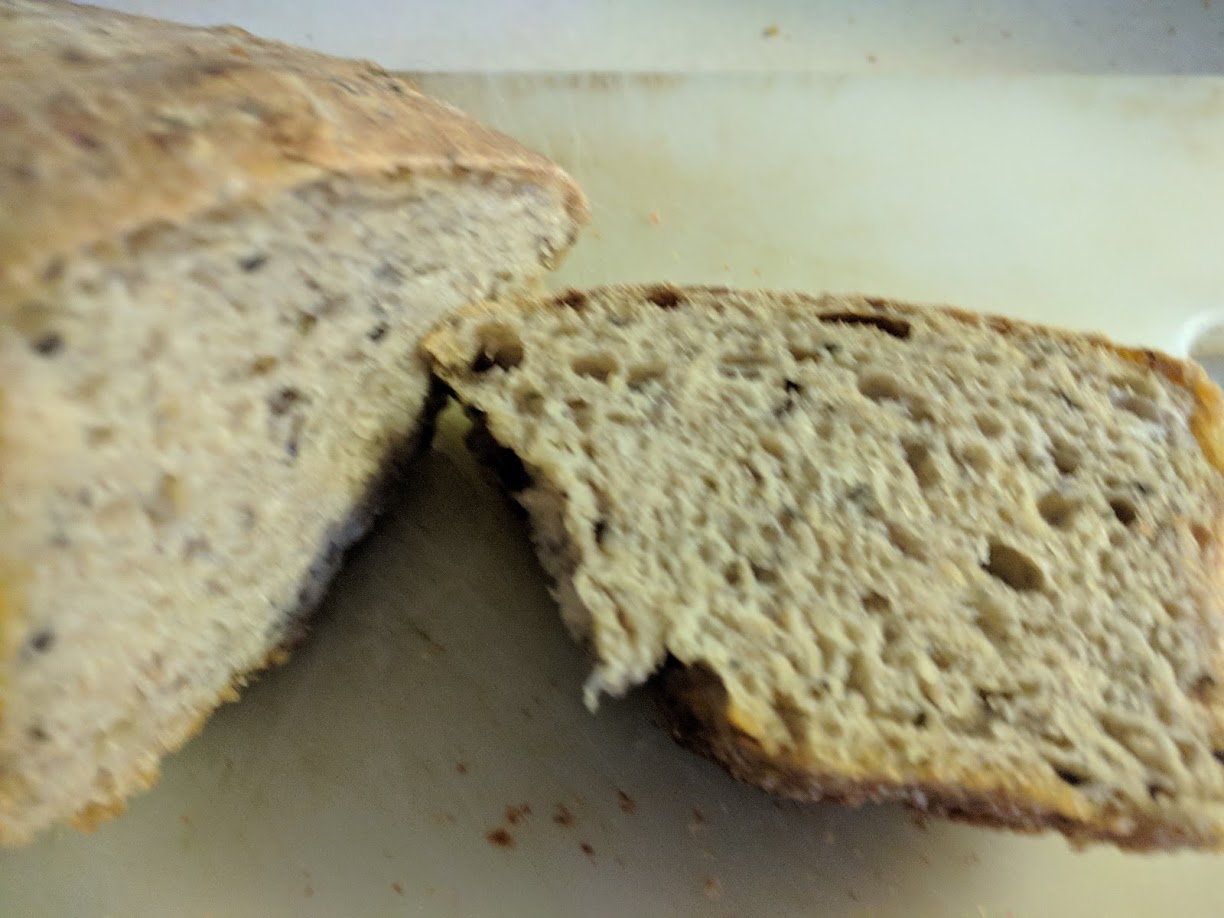
Another attempt at Danni's Caramelized Onion Sourdough with Parmigiano-Reggiano and Italian Herbs

I got the first part of the recipe right; the autolyzed flour was just the right texture. After autolyzing, one is to add yogurt, caramelized onion, and 270 grams of starter. When I added all that, the dough was so wet as to be unmanageable. I added about two cups of KA bread flour. The dough thickened up some but was still too wet to stretch and fold. I had to dip down into the dough, pull up a handful from the bottom, turn, dip down again, etc. I let the dough rise as directed and it was unmanageably wet. I glopped it into greased breadpans with my hands. Let it rise and baked it directly (no retarding).
I had to bake it at 360 degrees F, as that is all my broken oven will do. I baked it until it seemed right (forgot to set the time) and took it out. Could not get the first loaf out of the pan. Stuck all round. I mangled it pulling it out, then ate the crunched up portion :)
It is dang tasty, but I would rate it just another tasty failure.
I think the problem is in the second phase, when one adds yogurt, caramelized onion, and starter. I am going to have to adjust the starter amount downwards, because that has to be most of the added hydration. There's no reason to add that much, really, as my little yeasties will colonize furiously.
I am guessing that my starter is wetter than Danni's levain. Mine is made with a cup of ww flour and a cup of water. I pour off the hooch every day, but it is still a wet starter.


Equal parts of flour to water by volume would make a very high hydration starter.
Now I don't know how Danni keeps her starter but I'm guessing it would be closer to equal parts flour to water by weight making it 100% hydration. That would be about 1/2 cup water to 1 cup flour. Yours is in the range of 180-190% hydration.
Your starter will also ferment a lot faster than a 100% hydration starter (which is a very common percentage). The characteristic of your starter will also be different.
In my opinion I'd convert your starter to be 100% hydration and try again. It is easier and more accurate. You'll always know how much water and flour are in your starter just by weighing it.
I do not know where I got the 1:1 by volume figure for starter; I may have misunderstood 1:1 by weight. Of course, I did not have a scale until a year ago. My gloppy starter has worked just fine for the Reinhart pain au levain.
I will have to try the 1:1 by weight and see how my starter likes it :) I'm kinda fond of the thing. I have had it for years. It is descended from the Friends of Carl came-over-on-the-Oregon-Trail starter.
Build a levain from it when it comes to following a recipe which requires a lower hydration starter.
Simply take a little offurther from your starter and start feeding it equal parts by weight a day or two before you wish to bake.
This way you keep your starter how you prefer it and build an off shoot starter for baking with.
I'd also confirm with Danni first on how she keeps her starter.
P.s. you're pouring off water a lot because it's very hydrated. The flour can't handle it. If you like how a 100% hydration starter performs then you can think about keeping it that way.
And if you have been following it exactly then you have been building a levain starting with a little of your starter. Without knowing it you've done exactly what I just described. That is why it worked.
Now if you just used 270g of your starter in this recipe, which is a high percentage, it'll throw the recipe off.
If I am looking at the correct post for this recipe, it says "and 275 g of 80% freshly fed levain". This is a relatively low hydration starter, and if you have been using 1:1 by volume (and since the recipe calls for so much starter in the first place), it would be no wonder that the dough is too wet to manage.
Thanks all for correcting my ignorance on the subject of preferments. I completely missed that reference to 80%.
I will have to try this recipe again, with the proper hydration starter. Even when too wet the resulting bread tastes divine. Once more into the breach!
loading in the dough so that it doesn't stick. No sense making a great loaf of bread and having it weld itself to the pan. Danni pretty much uses an 80& hydration, by weight, levain for many of her breads - which are outstanding.
I have just been brushing the pans with olive oil. I try not to buy things in spray cans. Un-ecological. So I googled and found:
https://iambaker.net/homemade-pan-release-baking-spray/
I thought: I cannot use hydrogenated shortening! Shudder.
And then I googled and found various brands of shortening that claim to be non-hydrogenated. Made from palm oil, which is not healthy taken in large amounts, but I imagine I would not be taking in more than a smidge from the homemade pan release.
I will report back if problem is solved ... as I suspect it will be.